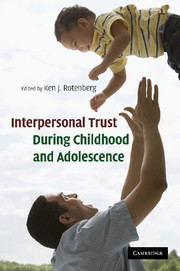Book contents
- Frontmatter
- Contents
- List of figures
- List of tables
- List of contributors
- Section I Conceptual foundations and issues
- Section II Childhood
- 5 Young children's trust in what other people say
- 6 Social relation and mutual influence analyses of children's interpersonal trust
- 7 Siblings and trust
- 8 The role of promises for children's trustworthiness and honesty
- 9 Liar liar! Pants on fire: Detecting the trustworthiness of children's statements
- Section III Adolescence and early adulthood
- Index
- References
5 - Young children's trust in what other people say
Published online by Cambridge University Press: 04 August 2010
- Frontmatter
- Contents
- List of figures
- List of tables
- List of contributors
- Section I Conceptual foundations and issues
- Section II Childhood
- 5 Young children's trust in what other people say
- 6 Social relation and mutual influence analyses of children's interpersonal trust
- 7 Siblings and trust
- 8 The role of promises for children's trustworthiness and honesty
- 9 Liar liar! Pants on fire: Detecting the trustworthiness of children's statements
- Section III Adolescence and early adulthood
- Index
- References
Summary
Young children's trust in what other people say
When we trust someone in the context of a close relationship, we expect them to act in a thoughtful, sensitive fashion. For example, we expect them to keep their promises, to provide help and solace when asked to do so, and to be discreet if we confide in them. In a series of studies, Rotenberg and his colleagues have shown that children vary in the expectations that they routinely bring to close interpersonal relationships, such as friendships with peers. Some children are unduly optimistic about other children's interpersonal trustworthiness, some are unduly pessimistic, and some strike more of balance between optimism and realism. In this chapter, we focus on a potentially related but different aspect of trust – on epistemic trust rather than interpersonal trust. As adults, we are often aware of our own lack of expertise or information on a given topic and we turn to others for guidance. For example, we seek information about medical, financial, and culinary matters, to name but a few areas. Yet we also recognize that individuals differ in the extent to which they provide reliable and accurate information: some informants are more trustworthy than others – in this epistemic sense.
It could be argued that interpersonal trust and epistemic trust are simply two different aspects of the same package.
- Type
- Chapter
- Information
- Interpersonal Trust during Childhood and Adolescence , pp. 87 - 109Publisher: Cambridge University PressPrint publication year: 2010
References
- 7
- Cited by



